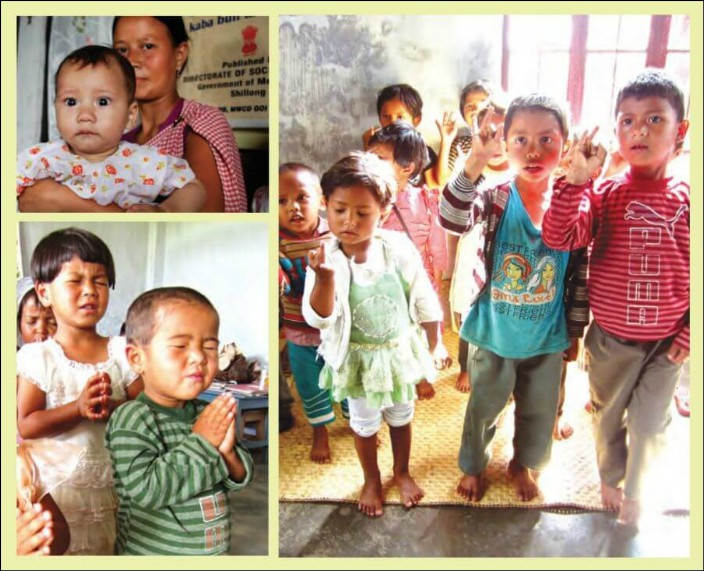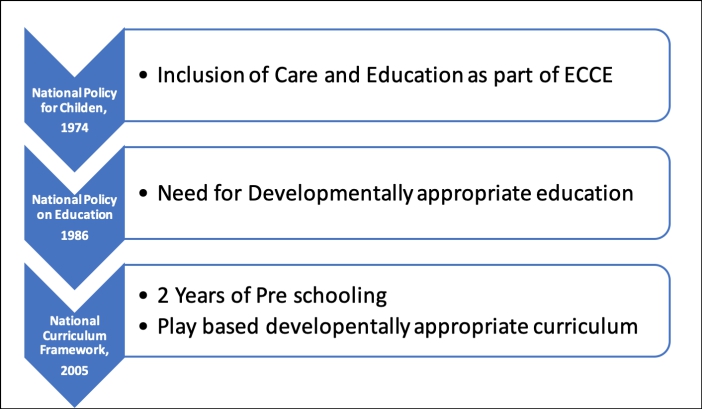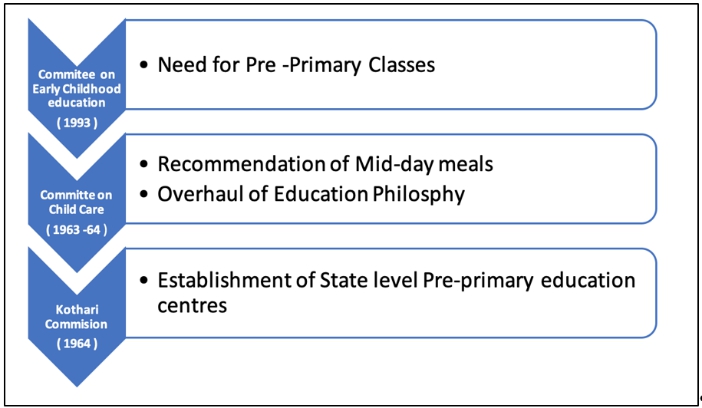While the three-language proposal of the draft NEP 2019, managed to hog all the limelight over the past one-week, other aspects of the draft NEP were not given the due discussion space. Here we discuss what the NEP has to say about ECCE (Early Childhood Care and Education).
[orc]
While the three-language proposal of the draft National Education Policy (NEP) 2019, managed to hog all the limelight over the past one-week, other aspects of the draft NEP were not given the due discussion space. One such is the draft NEP’s focus on ECCE (Early Childhood Care and Education). There are few land mark proposals made in the draft NEP, which could have a major impact on the Early Childhood Care & Education space in India.
The story so far: Lack of focus on education component of ECCE
The draft NEP has made certain important observations about ECCE before coming up with their proposals.
- Based on NCERT report ‘the impact of pre-school education on retention in primary grades’, the committee has asserted the importance of appropriate and early intervention in childhood.
- Underage children in class one is a result of lack of pre-primary options. The dise report which focused on the implications of underage students in Class I , highlights this problem.
- The committee takes cognizance of the looming learning crisis in India, in reference to ASER report, the data of which indicates a significant proportion of the students not having school readiness.
- There are general apprehensions on the investment involved in early childhood education. However, in reference to the various international reports, the committee agrees on the higher returns that an investment in early childhood would yield
- The committee, in its observations highlights the stark difference in learning between the children from various backgrounds. Various MHRD reports point to such differences.
- Reviewing the performance of ICDS over the years, the committee observes that the ICDS has been largely successful in delivering on the ‘Care’ component. However, it also remarks the failure in cognitive simulation and the education perspective.
- Apart from the public pre-programs, the role of private pre-schools was highlighted in the observations, which is mainly as downward extension to the school curriculum.
- The lack of age appropriate education across the preschools in India is a critical observation made by the committee.

These observations made by the Draft NEP committee, has highlighted many of the practical issues that are plaguing the ECCE scenario in India. One of the key aspects is around the lack of focus in providing cognitive stimulation and school readiness in the young children. The ‘care’ component of ECCE has however performed better and has found some success in different parts of the country.
What is the Vision for appropriate Early childhood intervention as per draft NEP?
Based on these observations, the draft NEP has come with the following with regards to ECCE:
- Pre- School to come under the aegis of the Right to Education Act (RTE)
- Focus on the ‘Education’ aspect of ECCE
- Anganwadis & Pre-schools to be attached to the School setup
- Develop an integrated primary school framework (age 3 years – 8 years)
- MHRD to oversee ECCE instead of the Anganwadi set-up and private play schools
This suggestions & proposals made in the draft NEP vary greatly with the existing setup. The existing setup is like the following.
- The education and care of children between the ages 3-6 is currently under the Anganwadi system, which is overseen by the Ministry of Woman & Child Development for the last 4 decades.
- The RTE Act, under whose aegis ECCE is proposed to be moved is currently responsible for children from 1st to 8th standards.
- The monitoring and emphasis of ECCE is now largely centered around health and nutrition aspects. Lack of training on cognitive stimulation and early childhood education, has created a dearth of teaching resource personnel in this space. Currently there are few NGOs who are actively involved in this space and trying to fill this critical gap.
ECCE in India: An evolving Story
The proposals in the draft NEP, while attempting to point towards a new direction, is an extension of a continued development of ECCE in India.
Let’s take a quick look at India’s ECCE story:


As can be seen, there policy framework surrounding early child hood education has seen a progressive growth – recognizing the need for pre-primary classes to including an integrated approach with focus on care and education. At least to the extent of the policy making, the idea seemed to be in the right direction.
Child Health & Nutrition also do not provide a positive picture
While the ASER report 2018, reveals an acknowledged fact about lower quality of education in India, and specifically highlighting the lack of school readiness among pre-primary children, the numbers regarding the health and nutrition of children also do not show a positive picture.
This is in contrast to the general notion that ‘care’ component has been a success story.
Here are few statistics from the ‘Children in India 2018’ report recently released by the Ministry of Statistics & Program Implementation (MoSPI) which reflect the current state of Child Wellness in India.
- Sex Ratio of children in age group 0-6 is 918.
- The Infant mortality rate is 34 per 1000 live births
- Under five mortality-rate is 43 per 1000 in Rural areas
- 38% of children under age 5 have stunted growth (41% in Rural and 31% in Urban areas).
- 36% of children under five are underweight
- 28% of children have mild anemia and 2% of children in India have severe anemia.
- Gross Enrollment Ratio is at 92% at primary level, which tapers off to 80% and 56% in secondary and senior secondary levels respectively.
- No. of working children (5 -14 years) sums up to 1.27 crores, which constitutes 5% of child population.
While a comparison over the decades does show a marked improvement, a lot is yet to be achieved even on the health and nutrition front.
Draft NEP: Early steps in right direction – Implementation would be the key
This then brings us to the larger question – What difference would NEP 2019 offer?
As with the earlier commission reports and studies, the intent and understanding are in the right place. However, the application & execution would hold the key.
The draft NEP 2019, did identify the following immediate actions in this direction:
- Developing an Integrated curriculum framework
- Spending resources on teacher training
- Developing infrastructure to support the framework
A time bound action plan on these aspects is vital to deliver on the objectives. Furthermore, addressing the ‘care’ aspect of ECCE in view of the new framework will also be critical.


